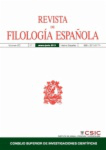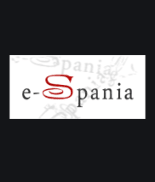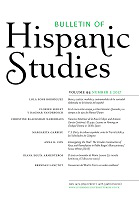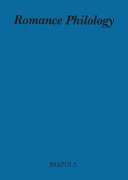
Nueva Revista Filologia Hispanica
Scope & Guideline
Cultivating Academic Excellence in Spanish Linguistics
Introduction
Aims and Scopes
- Hispanic Literary Analysis:
The journal examines various aspects of Hispanic literature, including critical analyses of texts, historical contexts, and the evolution of literary forms. - Linguistic Studies:
It publishes research on the Spanish language, its dialects, and its historical transformations, emphasizing both theoretical and practical linguistic approaches. - Cultural Contexts of Literature:
The journal emphasizes the relationship between literature and cultural phenomena, exploring how historical, social, and political contexts shape literary production. - Interdisciplinary Approaches:
It encourages interdisciplinary research that intersects with fields such as history, philosophy, cultural studies, and translation studies, enhancing the understanding of Hispanic literature and linguistics. - Publication of Bibliographies and Resources:
The journal provides bibliographic resources and critical editions that support research in Hispanic philology, serving as a reference for scholars in the field.
Trending and Emerging
- Interdisciplinary Research:
There is a growing trend towards interdisciplinary studies that combine literature, linguistics, and cultural analysis, allowing for richer interpretations of texts and contexts. - Globalization and Modernity:
Emerging papers increasingly address themes of globalization and modernity in Hispanic literature, reflecting contemporary societal concerns and the impact of global dynamics on local literary practices. - Critical Re-evaluations of Canonical Texts:
Recent publications focus on re-evaluating canonical texts through modern lenses, questioning established interpretations and exploring underrepresented voices within the canon. - Digital Humanities Approaches:
The integration of digital tools and methodologies in the analysis of texts and linguistic patterns is gaining traction, signaling a shift towards innovative research practices. - Multilingualism and Language Variation:
There is an increasing emphasis on multilingualism and the study of language variation within the Hispanic context, highlighting the complexities of linguistic identity in contemporary societies.
Declining or Waning
- Traditional Historical Narratives:
There is a noticeable decrease in papers focused solely on traditional historical narratives of Hispanic literature, suggesting a shift towards more contemporary and critical approaches. - Static Linguistic Frameworks:
Research employing fixed or traditional linguistic frameworks appears to be waning, as scholars increasingly adopt dynamic and evolving linguistic theories. - Localized Studies:
Studies that focus narrowly on specific regional literature without broader contextualization are becoming less common, indicating a movement towards more global and comparative analyses. - Historical Philology:
While historical philology remains important, there is a diminishing emphasis on purely philological approaches, with more researchers integrating linguistic and cultural perspectives. - Biographical Studies of Authors:
Papers centered solely on biographical accounts of authors are less frequent, as the journal shifts towards thematic and contextual analyses that engage more deeply with texts.
Similar Journals

Academic Journal of Modern Philology
Championing Open Access to Linguistic ResearchWelcome to the Academic Journal of Modern Philology, a premier platform dedicated to advancing the field of philology and linguistics. Published by the esteemed Committee Philology Polish Academy of Sciences, Wroclaw Branch, this open-access journal has been committed to disseminating high-quality research since 2014, ensuring widespread access and engagement within the scholarly community. With an ISSN of 2299-7164 and an E-ISSN of 2353-3218, the journal invites contributions that push the boundaries of contemporary philological inquiry, bridging traditional scholarship with modern linguistic challenges. Situated in Poland's vibrant academic milieu, it aims to foster interdisciplinary dialogue while highlighting the importance of philology in understanding cultural and linguistic diversity. Researchers, professionals, and students alike will find a wealth of insightful articles that contribute to the evolving landscape of modern language studies.

Cadernos de Letras da UFF
Fostering Global Dialogue in Humanities ResearchCadernos de Letras da UFF is a prominent academic journal published by the Department of History at the Federal University of Fluminense in Brazil. Since its transition to Open Access in 2014, it has fostered a spirit of collaboration and dissemination in the field of Literature and Linguistics, welcoming contributions that explore various aspects of literary studies, historical literature contexts, and linguistic phenomena. With a commitment to quality and academic rigor, the journal serves as a vital resource for scholars, practitioners, and students engaged in the humanities. The journal is dedicated to the advancement of knowledge through innovative research and critical analyses, making it an essential platform for sharing ideas with a global audience. The journal is based in Niterói, RJ, Brazil, and is indexed in various academic databases, enhancing its visibility and impact within the scholarly community.

REVISTA DE FILOLOGIA ESPANOLA
Pioneering Discoveries in the Art of Language and LiteratureREVISTA DE FILOLOGIA ESPANOLA is a distinguished academic journal dedicated to the fields of linguistics and literature, published by the CONSEJO SUPERIOR INVESTIGACIONES CIENTIFICAS (CSIC) since 1954, and has been an Open Access journal since its inception. Situated in Madrid, Spain, this journal has emerged as a crucial platform for the dissemination of scholarly research, with notable rankings including Q2 in Linguistics and Language and Q1 in Literature and Literary Theory as of 2023. The journal's commitment to fostering academic dialogue is reflected in its impressive Scopus rankings, including a 79th percentile in the Arts and Humanities for Literature and Literary Theory. Covering a wide range of topics from linguistic theory to literary critique, REVISTA DE FILOLOGIA ESPANOLA is essential reading for researchers, professionals, and students alike, providing valuable insights and cutting-edge research in the ever-evolving landscape of Spanish philology.

E-Spania-Revue Electronique d etudes Hispaniques Medievales
Advancing Knowledge in Medieval Spanish Literature and CultureE-Spania-Revue Electronique d'études Hispaniques Medievales, published by UNIV PARIS IV-PARIS-SORBONNE, is a prominent scholarly journal dedicated to the exploration of medieval Hispanic studies. With its Open Access format established since 2006, the journal facilitates the dissemination of research and critical discourse in the field, creating a vibrant platform for academics, researchers, and students alike. With an ISSN of 1951-6169, this journal aims to foster interdisciplinary dialogue surrounding the rich tapestry of medieval Spanish literature, history, and culture. Situated in the heart of Paris, this journal not only seeks to enhance knowledge production but also encourages collaboration among scholars globally, contributing to the ever-growing landscape of Hispanic studies. Through its commitment to accessibility and scholarly rigor, E-Spania remains an invaluable resource for those invested in understanding the complexities of the medieval Hispanic world.

CELEHIS-Revista del Centro de Letras Hispanoamericanas
Illuminating the Path of Latino LiteratureCELEHIS-Revista del Centro de Letras Hispanoamericanas is an esteemed academic journal dedicated to the exploration and dissemination of research in the field of Hispanic literature and cultural studies. Published by the UNIV NAC DE MAR DEL PLATA-CENTRO LETRAS HISPANOAMERICANAS, this journal has embraced open access since 2014, making its rich repository of scholarly articles available to a global audience. The journal aims to foster knowledge and dialogue surrounding the diverse literary expressions of Hispano-American cultures, providing insights that are crucial for researchers, professionals, and students alike. With its commitment to scholarly excellence, CELEHIS plays a significant role in enhancing the understanding and appreciation of Latino literature, while encouraging interdisciplinary collaboration and critical discourse within the academic community. Located in Mar del Plata, Buenos Aires, Argentina, it stands as a crucial platform for voices in the field, facilitating a deeper engagement with the literary heritage of the Spanish-speaking world.

BULLETIN OF HISPANIC STUDIES
Advancing Scholarship in Hispanic Linguistics and LiteratureBULLETIN OF HISPANIC STUDIES, published by Liverpool University Press, is a distinguished peer-reviewed journal dedicated to the exploration of Hispanic cultures, literatures, and linguistic studies. With an ISSN of 1475-3839 and an E-ISSN of 1478-3398, this journal is a vital platform for researchers, scholars, and students alike, offering critical insights and innovative research from a broad spectrum of perspectives within its fields. Notably, as of 2023, it holds a commendable position in Q2 of Linguistics and Language and Q1 in Literature and Literary Theory, demonstrating its significant impact in these disciplines. The journal spans a period from 2002 to 2024, providing a rich historical arc of scholarship in Hispanic studies. It operates in the United Kingdom and remains accessible through subscription-only models, ensuring a quality curation of content. With a native address at 4 Cambridge St, Liverpool L69 7ZU, England, the BULLETIN OF HISPANIC STUDIES remains committed to advancing knowledge and fostering dialogue in the ever-evolving landscape of linguistic and literary inquiry.

ROMANCE PHILOLOGY
Connecting Scholars through Passion for Language and LiteratureROMANCE PHILOLOGY is a distinguished academic journal dedicated to the exploration of language, literature, and linguistic theory within the Romance language family. Published by BREPOLS PUBL, it offers a platform for scholars, researchers, and practitioners to disseminate their findings and engage with the latest developments in these fields. The journal's impact factor reflects its standing, positioned within the Q4 category in Linguistics and Language and Q3 in Literature and Literary Theory for 2023, making it an essential resource for those studying Romance philology. Although coverage in Scopus was discontinued in 2021, the journal maintains a commitment to rigorous academic standards and comprehensive peer-review processes. With a broad scope encompassing theoretical and practical aspects of Romance languages and literatures, ROMANCE PHILOLOGY invites contributions that push the boundaries of knowledge and enrich the academic dialogue surrounding these vital areas of study. For those passionate about linguistic and literary pursuits, this journal stands as a significant gateway into the evolving discourse of Romance studies.

Dicenda-Cuadernos de Filologia Hispanica
Advancing Knowledge in Philology and Literary TheoryDicenda-Cuadernos de Filologia Hispanica, published by UNIV COMPLUTENSE MADRID, SERVICIO PUBLICACIONES, is a distinguished academic journal in the fields of linguistics, literature, and literary theory. Since its transition to Open Access in 2017, it has facilitated unrestricted dissemination of knowledge, making it an invaluable resource for researchers, scholars, and students interested in the rich tapestry of Hispanic philology. With an impact factor reflected by its Scopus rankings—at Q3 in Linguistics and Language and Q2 in Literature and Literary Theory—Dicenda serves as a vital platform for innovative research and critical discourse. The journal actively encourages submissions that explore contemporary and historical perspectives within its scope. Located in Madrid, Spain, the journal has steadily established itself as a significant contributor to the ongoing dialogue in the humanities, fostering a deeper understanding of linguistic and literary phenomena.

RILCE-Revista de Filologia Hispanica
Advancing Hispanic Philology through Innovative ScholarshipRILCE-Revista de Filologia Hispanica is a distinguished academic journal published by the Universidad de Navarra, serving as a pivotal platform for scholarship in the field of Hispanic Philology. Established in 2008 and ongoing through 2024, RILCE stands out in the academic community with a robust reputation reflected in its 2023 ranking; it holds Q2 status in Linguistics and Language and Q1 in Literature and Literary Theory. The journal is indexed in Scopus, where it ranks 165th out of 1106 in Literature and Literary Theory, showcasing its significant impact with an 84th percentile ranking. Located in Pamplona, Spain, RILCE aims to foster critical dialogues and disseminate innovative research that advances the understanding of linguistic and literary studies, making it an essential resource for researchers, professionals, and students alike. Although specific open access options may be limited, RILCE remains committed to enriching the academic dialogue within its disciplines.

CONFLUENCIA-REVISTA HISPANICA DE CULTURA Y LITERATURA
Fostering Dialogue in Hispanic Cultural StudiesCONFLUENCIA-REVISTA HISPANICA DE CULTURA Y LITERATURA, published by Colorado State University, is a pivotal academic journal that has been contributing to the fields of Cultural Studies, Literature and Literary Theory, and Visual Arts and Performing Arts since 2002. With its ISSN 0888-6091 and E-ISSN 2328-6962, the journal aims to foster interdisciplinary dialogue and showcase innovative research that bridges literary analysis with cultural phenomena. As highlighted by its impressive rankings, the journal holds a Q3 category in Cultural Studies and Q2 in both Literature and Literary Theory and Visual Arts and Performing Arts, reflecting its significance and the quality of its contributions. Although it currently does not offer open access, the journal remains a respected platform for scholars, providing rich content that engages and inspires further research in the humanities. As it converges years from 2002 to 2024, CONFLUENCIA stands at the forefront of exploring the complexities of Hispanic culture and literature, making it an indispensable resource for researchers, professionals, and students alike.